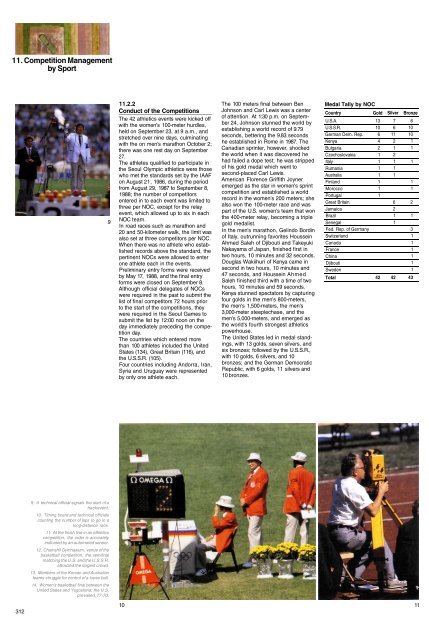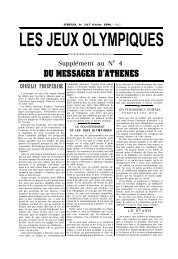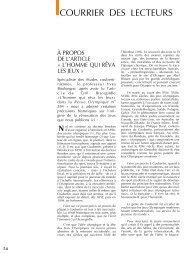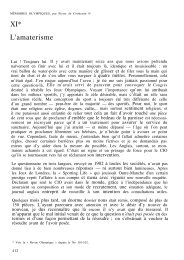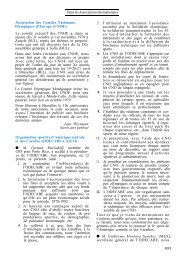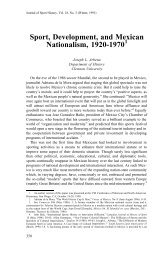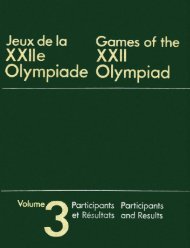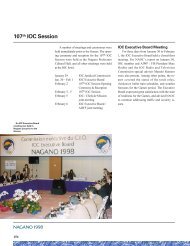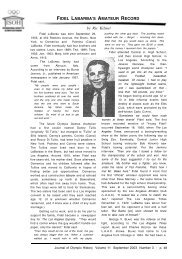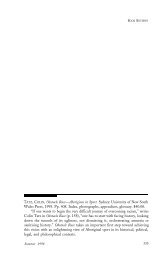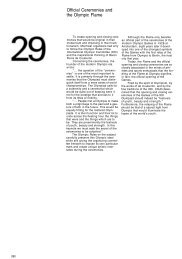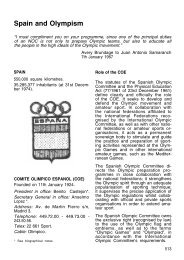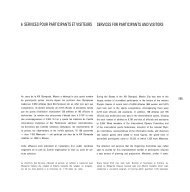Part 2 - LA84 Foundation
Part 2 - LA84 Foundation
Part 2 - LA84 Foundation
Create successful ePaper yourself
Turn your PDF publications into a flip-book with our unique Google optimized e-Paper software.
11. Competition Management<br />
by Sport<br />
312<br />
9. A technical official signals the start of a<br />
track event.<br />
10. Timing board and technical officials<br />
counting the number of laps to go in a<br />
long-distance race.<br />
11. At the finish line in an athletics<br />
competition, the order is accurately<br />
indicated by an automated sensor.<br />
12. Chamshil Gymnasium, venue of the<br />
basketball competition; the semifinal<br />
matching the U.S. and the U.S.S.R.<br />
attracted the largest crowd.<br />
13. Members of the Korean and Australian<br />
teams struggle for control of a loose ball.<br />
14. Women's basketball final between the<br />
United States and Yugoslavia; the U.S.<br />
prevailed, 77-70.<br />
9<br />
11.2.2<br />
Conduct of the Competitions<br />
—————————————–<br />
The 42 athletics events were kicked off<br />
with the women's 100-meter hurdles,<br />
held on September 23, at 9 a.m., and<br />
stretched over nine days, culminating<br />
with the on men's marathon October 2;<br />
there was one rest day on September<br />
27.<br />
The athletes qualified to participate in<br />
the Seoul Olympic athletics were those<br />
who met the standards set by the IAAF<br />
on August 21, 1986, during the period<br />
from August 29, 1987 to September 8,<br />
1988; the number of competitors<br />
entered in to each event was limited to<br />
three per NOC, except for the relay<br />
event, which allowed up to six in each<br />
NOC team.<br />
In road races such as marathon and<br />
20 and 50-kilometer walk, the limit was<br />
also set at three competitors per NOC.<br />
When there was no athlete who established<br />
records above the standard, the<br />
pertinent NOCs were allowed to enter<br />
one athlete each in the events.<br />
Preliminary entry forms were received<br />
by May 17, 1988, and the final entry<br />
forms were closed on September 8.<br />
Although official delegates of NOCs<br />
were required in the past to submit the<br />
list of final competitors 72 hours prior<br />
to the start of the competitions, they<br />
were required in the Seoul Games to<br />
submit the list by 12:00 noon on the<br />
day immediately preceding the competition<br />
day.<br />
The countries which entered more<br />
than 100 athletes included the United<br />
States (134), Great Britain (116), and<br />
the U.S.S.R. (105).<br />
Four countries including Andorra, Iran,<br />
Syria and Uruguay were represented<br />
by only one athlete each.<br />
The 100 meters final between Ben<br />
Johnson and Carl Lewis was a center<br />
of attention. At 1:30 p.m. on September<br />
24, Johnson stunned the world by<br />
establishing a world record of 9.79<br />
seconds, bettering the 9.83 seconds<br />
he established in Rome in 1987. The<br />
Canadian sprinter, however, shocked<br />
the world when it was discovered he<br />
had failed a dope test; he was stripped<br />
of his gold medal which went to<br />
second-placed Carl Lewis.<br />
American Florence Griffith Joyner<br />
emerged as the star in women's sprint<br />
competition and established a world<br />
record in the women's 200 meters; she<br />
also won the 100-meter race and was<br />
part of the U.S. women's team that won<br />
the 400-meter relay, becoming a triple<br />
gold medalist.<br />
In the men's marathon, Gelindo Bordin<br />
of Italy, outrunning favorites Houssein<br />
Ahmed Saleh of Djibouti and Takeyuki<br />
Nakayama of Japan, finished first in<br />
two hours, 10 minutes and 32 seconds.<br />
Douglas Wakiihuri of Kenya came in<br />
second in two hours, 10 minutes and<br />
47 seconds, and Houssein Ahmed<br />
Saleh finished third with a time of two<br />
hours, 10 minutes and 59 seconds.<br />
Kenya stunned spectators by capturing<br />
four golds in the men's 800-meters,<br />
the men's 1,500-meters, the men's<br />
3,000-meter steeplechase, and the<br />
men's 5,000-meters, and emerged as<br />
the world's fourth strongest athletics<br />
powerhouse.<br />
The United States led in medal standings,<br />
with 13 golds, seven silvers, and<br />
six bronzes; followed by the U.S.S.R.,<br />
with 10 golds, 6 silvers, and 10<br />
bronzes; and the German Democratic<br />
Republic, with 6 golds, 11 silvers and<br />
10 bronzes.<br />
Medal Tally by NOC<br />
Country<br />
U.S.A.<br />
U.S.S.R.<br />
German Dem. Rep.<br />
Kenya<br />
Bulgaria<br />
Czechoslovakia<br />
Italy<br />
Rumania<br />
Australia<br />
Finland<br />
Morocco<br />
Portugal<br />
Great Britain<br />
Jamaica<br />
Brazil<br />
Senegal<br />
Fed. Rep. of Germany<br />
Switzerland<br />
Canada<br />
France<br />
China<br />
Djibouti<br />
Sweden<br />
Total<br />
Gold<br />
13<br />
10<br />
6<br />
4<br />
2<br />
1<br />
1<br />
1<br />
1<br />
1<br />
1<br />
1<br />
42<br />
Silver<br />
7<br />
6<br />
11<br />
2<br />
1<br />
2<br />
1<br />
1<br />
1<br />
6<br />
2<br />
1<br />
1<br />
42<br />
Bronze<br />
6<br />
10<br />
10<br />
1<br />
1<br />
10 11<br />
1<br />
1<br />
1<br />
2<br />
1<br />
3<br />
1<br />
1<br />
1<br />
1<br />
1<br />
1<br />
43


